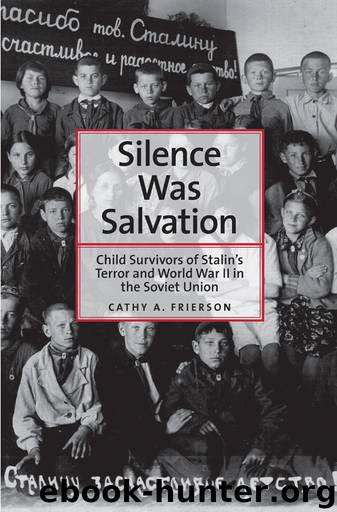Silence Was Salvation by Cathy A. Frierson

Author:Cathy A. Frierson [Frierson, Cathy A.]
Language: eng
Format: epub
Publisher: Yale University Press
Published: 2014-03-14T16:00:00+00:00
Irina Andreevna Dubrovina’s high school graduating class, ca. 1947; she is the first student on the left in the front row (Private collection of I. A. Dubrovina)
CF—Before that, did you feel alone?
IA—Before then, I didn’t feel different from the others. But when they all entered the Komsomol, they started to have all sorts of Komsomol meetings, and they would ask me to leave. So this was very humiliating for me. . . . I tried not to discuss this with Mama. I knew that this would traumatize Mama badly. I simply said nothing. I just had to tell her that they hadn’t admitted me to the Komsomol. I told her, but that was all. Mama took this as to be expected. They didn’t admit me, so they didn’t admit me. But that I was suffering this exclusion in my grade, that she didn’t know. I hid it from her.
CF—Well, how did you feed yourselves?
IA—We fed ourselves like this—at first, in the settlement during the first year, we had absolutely nothing. We arrived in late autumn. We couldn’t plant anything. The collective farm gave us a bucket of potatoes. That was all that they could spare us. The collective farm couldn’t help us either, it was also very poor. They settled us with a peasant family, a grandmother, grandfather, their son was at the front, their daughter-in-law lived with them with her two small children. We lived in one room with them. We slept in the loft, they had lofts there, some on the stove.11 The old folks would sleep on the stove, but we were on the loft with these little children also. And the daughter-in-law slept on the only bed below. Because she had to get up early to tend to the cow, to the livestock. And we slept up there. As a rule, we simply went hungry. . . . This first year was terrible.
The second year was a bit easier, because they gave us some land. We planted potatoes, so it was much easier. The government distributed five hundred grams of oats, ground with the hulls, per month to evacuees. Not even sifted. And so, Mama and I received one kilogram of these oats per month, and that was all. . . . So, we sifted these oats, from the hulls we made oat pudding; from this flour mixed with potatoes, I made bread. Just a tiny bit of the flour; the rest, mashed potatoes. I learned how to work with a Russian stove. Mama couldn’t master anything you do in a village. Nothing. I mastered the Russian stove, I baked bread, it was enough for us. . . . Half-starving, we lived half-starving. In the summer, I planted gardens. When I had more or less mastered farming, I started to grow tomatoes to sell. I would sell tomatoes, and use the money to buy milk. Bread was beyond reach, but milk, dairy products, I could buy these. Sometimes a small piece of village butter, sometimes farmer’s cheese.
Download
This site does not store any files on its server. We only index and link to content provided by other sites. Please contact the content providers to delete copyright contents if any and email us, we'll remove relevant links or contents immediately.
Fanny Burney by Claire Harman(26603)
Empire of the Sikhs by Patwant Singh(23086)
Out of India by Michael Foss(16853)
Leonardo da Vinci by Walter Isaacson(13337)
Small Great Things by Jodi Picoult(7144)
The Six Wives Of Henry VIII (WOMEN IN HISTORY) by Fraser Antonia(5515)
The Wind in My Hair by Masih Alinejad(5095)
A Higher Loyalty: Truth, Lies, and Leadership by James Comey(4964)
The Crown by Robert Lacey(4817)
The Lonely City by Olivia Laing(4802)
Millionaire: The Philanderer, Gambler, and Duelist Who Invented Modern Finance by Janet Gleeson(4479)
The Iron Duke by The Iron Duke(4357)
Papillon (English) by Henri Charrière(4274)
Sticky Fingers by Joe Hagan(4201)
Joan of Arc by Mary Gordon(4115)
Alive: The Story of the Andes Survivors by Piers Paul Read(4033)
Stalin by Stephen Kotkin(3969)
Aleister Crowley: The Biography by Tobias Churton(3640)
Ants Among Elephants by Sujatha Gidla(3467)
